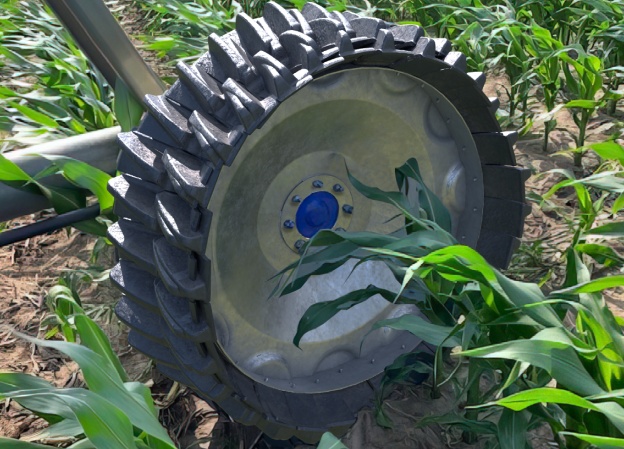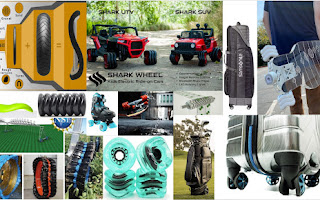By SMB Group’s Kelly Teal, Contributing Analyst, and Laurie McCabe, Co-founder
It’s not every day that someone quite literally reinvents the wheel.
But that’s just what David Patrick and Zack Fleishman did about 10 years ago. Now, after a decade of prototyping, testing, and strategizing, their efforts are paying off. Their company, Shark Wheel, has gone from a disruptor in skateboarding to a disruptor in the farming, manufacturing, and luggage industries, as well as the U.S. military. Along the way, the company has caught the attention of The Discovery Channel, Shark Tank, and other big media outlets.
Now, Shark Wheel is a multi-million dollar company and is headed towards its first-ever profitable year — with a little help from Xero’s online accounting platform, and its partner Synder, which provides software that synchronizes and integrates Xero with online payments processing systems.
More on that in a bit. First, why “Shark Wheel”?
Nature’s Perfect Shape?
The six-sided wheel Patrick designed imitates the sine wave, a form “found throughout nature,” Fleishman says. Perhaps the most intriguing example of that reality comes via a shark’s jaw — hence the name Shark Wheel. (Sine waves also show up in the way radio and ocean waves move, among a variety of other natural processes and shapes.)
Indeed, right after Fleishman saw Patrick demonstrate what would become the Shark Wheel, “I called the patent lawyer.”
Yet despite Patrick’s discovery and Fleishman’s subsequent strategic decisions, Shark Wheel, the company, took a while to get off the ground. Years of testing ensued in partnership with various universities. Meanwhile, Shark Wheel leaders had to learn the nuances of mass production, and marketing.
Fleishman says targeting the skateboarding world first made the most sense, before branching out.“We kind of wanted to make it cool,” he says of the Shark Wheel. “We thought if we started on strollers it wouldn’t necessarily be easy to transfer to skateboards later on.”
Besides the cool factor, Patrick and Fleishman also had to consider how to make the Shark Wheel accessible to a variety of people. Going too niche at first would limit the company.
“We thought if we started in a market that had a lower barrier to entry, it’s obviously cheaper to make wheels for skateboards than four-foot-tall farming wheels like we are now,” Fleishman says.
In addition, Shark Wheel executives knew they wanted the company to grow into a name known for solving real problems.
“We didn’t just want to look funny,” Fleishman says. “We wanted to be a technology and we knew the only way that we would do that would be to solve problems and have scientific proof that we do.”
For instance, one challenge skateboarders face is when circular wheels encounter objects, even small ones such as gravel and twigs. Riders using traditional wheels try to avoid obstacles so they won’t crash. But with Shark Wheels, they don’t have to.
“A normal wheel acts like a steamroller and it tries to go over the pebble,” Fleishman explains. “A Shark Wheel moves around objects. It doesn’t try to go over them, it goes around them, like, a snake would, and it’ll physically tend to push them left or right out of the way. … We’re basically like the Jeep of the skateboarding industry.”
Shark Wheel initially funded its entry into the skateboard wheels market with a Kickstarter campaign that netted almost eight times its initial goal. It attracted the attention of award-winning skateboarder Tony Hawk and was used by skateboarders who placed in various competitions around the world, and the product appeared on ABC’s Shark Tank in 2015.
Social media, too, put millions more eyes on Shark Wheel. As skateboarders posted videos of their feats rolling in the snow, over dirt and grass, all without falling or tripping, Shark Wheel’s exposure and reputation kept rising. The company now sells its skateboarding wheels on its website and through a variety of retailers and etailers.
Disrupting Agriculture
With that success under their belts, Patrick and Fleishman set their sights on other markets, starting with agriculture. In fact, right after Shark Wheel aired on Shark Tank in, “we had two farmers standing at our door,” Fleishman says.
In farming, circular wheels create problems. Take the center-pivot irrigation process, which most farmers use for watering crops, as a prime example. The irrigation equipment rolls on wheels and those wheels dig trenches — often up to five feet deep — into the soil. As a result, machines can break and tires can flatten. It’s tough for farmers to get these broken machines out, and once they do, they have to throw the soil back into the trenches so they can grow crops there—adding up to a tremendous amount of effort and money.
Thanks to the help of a 2018 National Science Foundation (NSF) grant, Shark Wheel was able to gain the momentum it needed to bring its center-pivot irrigation wheels to help solve this problem.
Fast forward, and Shark Wheel has inked deals with Bridgestone Firestone and other tire companies to use its wheels on their farm equipment. Best of all, testing by the NSF and Shark Wheel revealed that agricultural Shark Wheels save farmers an average of $26,000 per year. Now, agriculture stands out as the company’s largest business group.
Shark Wheel continues to apply its successes to other sectors where its unique design offers advantages. “We’re on U.S. military deployment bags,” Fleishman says. “We’re on PGA Tour golf bags. We’re on Samsonite luggage, we’re on many different things.”
Reinventing Accounting and Financial Processing to Scale the Business
But when it comes to accounting and financial processing, Shark Wheel had, until recently “kind of acted like a dinosaur and everything’s been printed pieces of paper,” Fleishman says. The company did use some software but it left “a lot to be desired,” Fleishman adds.
Knowing it was time to up Shark Wheel’s financial management game, Fleishman turned to Xero, cloud-based accounting software for small businesses. He needed a simple and intuitive interface, accompanied by an affordable price tag, integration options, and an emphasis on automation. Post-implementation, Shark Wheel has experienced a significant reduction in manual financial processes and a marked increase in efficiency. For example, Shark Wheel can connect its bank, invoicing, and online commerce to Xero. All of the data pull in automatically, eliminating the need for someone to enter the information.
Here’s the true payoff, per Fleishman: With Xero, Shark Wheel now has “a lot more free time to focus on growing our business instead of managing it.”
On top of that, Shark Wheel further relies on Xero partner Synder to manage other critical financial processes with Xero. Synder’s application integrates payments platforms such as Shopify, Amazon, Stripe, PayPal, Square, and more with Xero, so companies can manage their finances in one place. Synder streamlines the accounting process even more for Shark Wheel, from tallying inventorying and cost of goods sold to tracking tax rates and more. For Fleishman, who’s not a trained accountant and who would rather exert his energy on scaling Shark Wheel’s business, those capabilities have proven invaluable.
“I didn’t know that we could automate as much as we’re able to automate today,” he says.
Synder provides a single source of financial truth for Shark Wheel, via Xero. And whenever Fleishman has a question or needs help, Synder makes sure the right person is on deck to assist.
“It was a perfect match,” Dasha Kessel, Leading Acquisition Specialist at Synder, says of the relationship with Shark Wheel.
Anna Misiuro, Lead Content Manager at Synder, agrees. “We’re happy to help Shark Wheel reinvent the wheel.”
Perspective
Small business owners with impactful products and services don’t want to spend excess time on managing their financials. They’d rather focus on delivering on the ideas that will change customers’ lives, and their own growth and profitability.
Modern financial automation solutions help streamline financial operations and get a more comprehensive and accurate view of the business.
Xero and Synder have provided the automation, integration, insights, and personalized support that Shark Wheel needed to get take the drudgery out of financial management and focus on new product development, growth, and profitability.
Note: Xero is an SMB Group client.
© SMB Group, 2023



